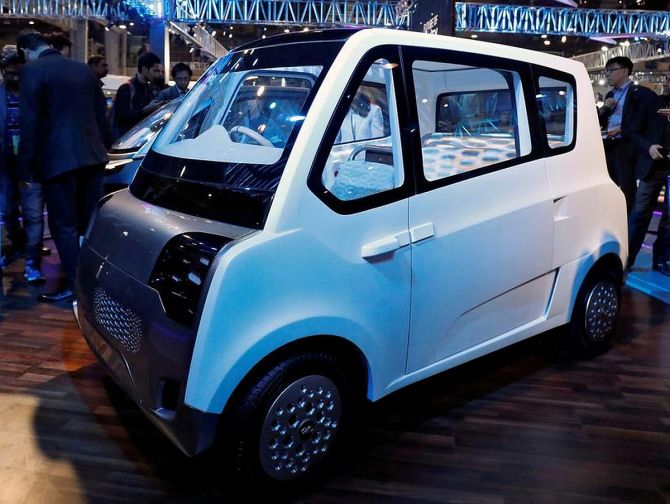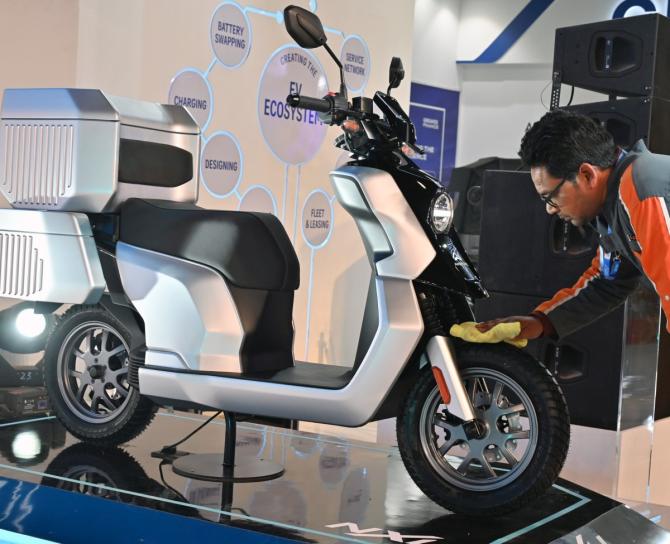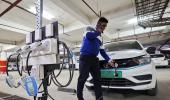The EV industry is at an inflection point and batteries will play a critical role ahead -- batteries and related components typically constitute 35-45 per cent of an EV's costs.

Last year, Coimbatore-based electric two-wheeler (E2W) maker Boom Motors literally faced the heat after one of its bikes caught fire.
This occurred at a time when similar accidents in bikes made by other E2W makers were grabbing headlines.
As a result, the company not only changed its name to Bharat New-Energy Company (BNC) but also developed an in-house battery -- Etrol 40.
“The primary driver for us to develop this battery has been safety. Even though there are over 100 battery makers in India, there is an absolute shortage of good-quality vendors,” said Anirudh Ravi Narayanan, chief executive officer and co-founder, BNC.
Etrol 40, a 2.1 kilowatt hour (kWh) battery pack that can be used by two-wheelers, three-wheelers and light vehicles, will not only be for BNC's captive consumption but will be marketed to other players as well.
BNC is not the only one. Recently, Tata Group, which commands an 85 per cent share of the electric car market, signed an agreement with the Gujarat government to set up a lithium ion cell factory at an investment of Rs 13,000 crore having a capacity of 20-gigawatt hour (GWh) at Sanand, which could be doubled in the second phase of expansion.
Another plant in Europe is also planned. These batteries would be supplied to Jaguar Land Rover, Tata Motors etc.
Agratas Energy Storage Solutions, the newly-formed company of Tata Sons that aims to become an end-to-end player in battery cell systems, will also supply to light and heavy commercial vehicle segments, besides two- and three-wheelers.
Gradually an ecosystem for electric vehicle (EV) batteries is growing in India as EV sales rise with every passing year.
The EV battery market in India is valued at $4.3 billion (as of 2022).
The market is growing at a CAGR of 22.1 per cent and is expected to grow to $25.3 billion by the end of this decade, BNC said.
At present, EV share in two-wheelers is 6.3 per cent; in three-wheelers 54 per cent; and around 1.8 per cent in passenger vehicles (as of May 2023).
Analysts expect this share to jump to 46 per cent in two-wheelers and 20 per cent in passenger vehicles by FY30.
Globally, EV car sales surged to 10 million units, or about 14 per cent of global car sales in 2022 calendar year.
The EV industry is, thus, at an inflection point and batteries will play a critical role ahead -- batteries and related components typically constitute 35-45 per cent of an EV's costs.
The Tata plant will be India's first lithium ion cell factory; other battery units are essentially assembly operations that import components from China, South Korea and so on.
For example, Hyundai Motor India's upcoming Rs 20,000-crore Tamil Nadu plant will have a battery pack assembly facility (178,000 units).
Similarly, SoftBank-backed Ola Electric Mobility had lined up its expansion plans at its Pochampally unit in Krishnagiri district of Tamil Nadu at an investment of around Rs 7,614 crore for a four-wheeler EV manufacturing plant and a 20-Gw battery manufacturing unit.
Mahindra and Mahindra (M&M), which is building a Rs 10,000-crore EV manufacturing plant in Maharashtra, had indicated last year that they are open to invest in an EV battery manufacturer in order to secure its future supplies of battery-cells.

The country's EV ambitions sparked after the Geological Survey of India discovered in February lithium ore in a district in Jammu and Kashmir (J&K) with estimated reserves of 5.9 million tonnes (MT), the world's largest reserves after Chile and Australia.
This is sufficient to meet India's lithium requirements for the next 50 years.
This was followed by another set of reserves traced at Rajasthan's Degana, which is considered sufficient to meet 80 per cent of the country's requirement.
If the entire 5.9 MT turns out to be extractable, it could support 10 TWh (terawatt-hour) of lithium ion cell manufacturing.
This can be compared to the current demand of lithium ion batteries of 3 GWh, which is projected to touch 20 GWh by 2026 and 70 GWh by 2030, according to a report by Arthur D Little.
This discovery is critical because the government has set an ambitious EV sales penetration target of 30 per cent for private cars, 70 per cent for commercial cars, 40 per cent for buses, and 80 per cent for two- and three-wheelers by 2030.
Not only will such domestic availability help India meet its climate related commitments, but it also has the potential to make India self-sufficient given that China controls over 75 per cent of the lithium refining globally.
Three government companies -- National Aluminium Company, Hindustan Copper, and Mineral Exploration Corp -- are collaborating to enhance lithium sourcing, including acquisitions and manufacturing.
Around 50 per cent of the current deposits are concentrated in three countries -- Argentina, Bolivia and Chile.
The discovery, which has the potential to change the dynamics of the global lithium market, also positions India as a cell manufacturing hub.
However, how much of the lithium reserves are realistically recoverable will be understood later -- the commercial viability of the lithium reserves could take five to seven years to be established.
This means that these proven reserves are unlikely to see commercial production before 2030.
In addition, the J&K reserves are in difficult terrain, for which getting environment clearance may itself be an uphill task.
On the other hand, current lead acid battery makers, which go into internal combustion engines (ICE), are also aggressively looking at lithium ion batteries.
Amara Raja Batteries is coming up with a lithium cell and battery pack manufacturing giga factory in Telangana and the group is planning to invest around Rs 9,500 crore over 10 years in this space in the state, including in research and development.
“We understand that there is a transition taking place. We also see that this is a long-tenured sunset. We definitely haven't seen the peak ICE engine production. We see that there is a clear runway of 10-15 years.
"Lead acid is growing alongside lithium. For lithium, some challenges are there. We are looking at technology investments and partners,” said Harshavardhana Gourineni, executive director, automotive and industrial batteries, Amara Raja.
Ignition for change
- Lithium ion average battery pack prices were above $1,200/kWh in 2010
- Prices reduced 89% to $132/kWh in 2021
- Battery packs constitute 35-45% of vehicle cost
- Battery prices increased in 2022 to $171/kWh as raw material prices went up
- Global battery demand for EVs is expected at 2.2 TWh to 3.5 TWh in 2030
- According to Benchmark Mineral Intelligence, the announced battery production capacity by private companies for EVs in 2030 amounts to 4.6 TWh
Source: Emkay Research
Feature Presentation: Rajesh Alva/Rediff.com











